#this isn't even the most egregious example
Explore tagged Tumblr posts
Text
Isaac's personality isn't too much the issue with me because I've heard the argument that his whole "foppish" energy was closer to what a lot of upper class man were like at the time so he wouldn't have stood out as much as 'stereotypically gay' as today - I'd love to have someone who knows more about History confirm whether that's true or not.
But even then yes, the show does love to Tell rather than Show. Most egregious example I can think of is when we're first introduced to Nigel and he and Isaac exchange a few tense words then you have Sam in the corner go "Woah these two have so much chemistry!" Oh, no, no, no, that is something you should never say out loud, not about what you plan to be your shows main couple, that is always something the audience needs to decipher for themselves. In the same vein we see Flower say she loves Thor and Pete say he has a crush on Alberta all in the very early episodes without letting us see that develope ourselves (or a smart way would be to show flashbacks of them forming those feelings).
Like just to compare, imagine if En Francais had Robin just going up to Humphrey and saying "oh by the way I had a one sided platonic crush on your wife" instead of showing us scenes of him and Sophie. We never once actually hear Robin say what his feelings for Sophie actually were but it's not needed because his body language and expressions as he stayed with her said enough.
This is no hate to the American Ghosts because I genuinely think it has some heartfelt and funny moments that I enjoy - But I get so frustrated when everything get’s explained to you. Like something happens, and one of the ghosts will talk about these oddly specific details, before they all explain like “oh, that’s never happened before! It must’ve etc etc”
The British version does it too, but it feels more like sharing memories rather than explaining whole concepts to the viewer rather than just showing it.
79 notes
·
View notes
Text
Ok listen. I made the playlist. I decided exactly what to put on it. I had a specific fic (that is determined to be written against my will) in mind when I added every single song. I did this months ago, and I'm only just now doing the Ben Affleck cigarette meme about it.


Why no, officer, there's no angst or pining in here... *visibly straining to keep door the angst and pining are hiding behind shut*
#would like to add this isn't even the whole playlist#or even the most egregious example of this in all my inspo playlists#clearly the more feelsy the tunes the more insane over it i expect to get
8 notes
·
View notes
Text
brief rant about X-men 97 because apparently whitewashing is still a thing in the 2020s
I know season one came out almost a year ago, but I'm still frustrated with X-Men '97's portrayal of Roberto Da Costa. In the comics, Roberto is the son of an Afro-Brazilian millionaire. His mutant powers developed after he was the victim of a racial hate crime in Rio de Janeiro. Admittedly, the comics have a nasty habit of lightening Roberto's skin and giving him Eurocentric features but his first appearance makes it clear that he’s a dark-skinned, visibly black man.
That’s not what we get in X-Men '97. Instead, Roberto has a tiny nose, rail-thin lips, and barely textured hair (it honestly looks less like it’s wavy and more like straight hair that's just been styled.) Whitewashing is always frustrating, but it's downright disheartening when it happens in a franchise that centers around diversity and anti-discrimination. X-Men '97 has demonstrated its ability to engage with diverse backgrounds effectively. The effort and care that went into portraying Magneto's Jewish heritage is a testament to this. It's telling that they'll do that for a white character but couldn't even be bothered to draw Roberto with black features. They don't even explore how his Brazilian heritage affects his view on being a mutant. The Da Costas are Brazilian immigrants. This makes them outsiders in New York's (predominantly white) wealthy circles. That could add a lot of nuance to Roberto's belief that he shouldn't "rub [his mutation] in people's faces." If Roberto was visibly black, that would add even more nuance to that stance because he (and his father) would be an outsider, even among other Brazilians. I don't think there was any malice behind this decision. I think they were just lazy and careless.
To be clear, I'm glad they did Magneto's Jewish heritage justice, and I don't want to imply that antisemitism isn't an issue. But a lot of Jews are white, and they experience the privilege that comes with that. You can't tell that someone is Jewish just by looking at them (unless they're wearing religious clothing and/or jewelry). It's the opposite for most black people. Magneto and Kitty Pryde are both white. While I enjoy seeing how that shapes their view of anti-mutant discrimination, I wish it was explored more with characters whose race or ethnicity is more visible. It just feels like they don't care. Which sucks because I fucking love the X-Men. The franchise is so deeply rooted in diversity and anti-discrimination, and shit like this makes it ring hollow.
For context, here's comic Roberto vs. cartoon Roberto:


#this isn't even the most whitewashed version of berto#both new mutants and days of future past cast white passing actors to play him#his actor in dofp isn't even brazilian#young xmen and new avengers vol. 4 are some pretty egregious examples of him being whitewashed in the comics#roberto da costa#sunspot#xmen#xmen 97#whitewashing#sidenote#i dont understand why his official nickname in the comics is bobby#they already have a bobby#plus i'm pretty sure that beto or berto would be more likely in brazil#I’m a firm believer that reverse whitewashing isn’t a thing#race is usually a non factor in white characters’ story arcs#characters of color are almost never given stories that don’t center around being a person of color#I wish that it was more common for a character’s culture to inform their arc and personality without it being their whole story#like you can have diverse characters that aren’t completely one dimensional
2 notes
·
View notes
Text
I was tagged by @frodo-of-the-nine-fingers to put my music on shuffle and list the first 10 songs! I know the game is to do your 'on repeat'(?) playlist, but I don't use Spotify(??) and considering I OBSESSIVELY listen to single songs for days or weeks on end at any given time (seriously spent a week listening to nothing but 'It's All Coming Back To Me Now' by Celine Dion over and over. Yes even when I had other people in my car), I don't think any repeat playlist would be a fair representation of my overall taste, even if I could find how to see it on Apple Music. So I just said fuck it and put all my songs on shuffle lol
ANYWAY
Here it is:
Higher Love by James Vincent McMorrow
Exile by Enya
New York by St. Vincent
Papers ("You're not from around here, son...") by Patrick Page, Amber Gray, André de Shields, Eva Noblezada & Reeve Carney (Hadestown)
Country Down by Beck
[Yicheng Group] Gu Cheng by Chen Zhuoxuan (陈卓璇) & Sun Bolun (孙伯纶) (The Untamed music album)
Through Me (The Flood) by Hozier
Flowers of the Field by Sky Sailing
Osono's Request by Joe Hisaishi (Kiki's Delivery Service soundtrack)
Cassandra by ABBA
#tag game#frodo-of-the-nine-fingers#I feel like these kinds of music games always highlight how all over the place my taste is lol#and this isn't even the most egregious example#They also always make me feel the need to give so many more recs in so many other genres I listen to regularly#which is literally the reason I started doing a radio show of just my weird-ass music taste lol#ANYWAY#I digress - thanks for tagging me!
2 notes
·
View notes
Text
The funniest one for me was when I helped a friend find out they were a system. They were venting to me about some stuff that reminded me of a time I was questioning. Not expecting anything to come of it, I asked if they'd ever looked into dissociative identity disorder. At the time I thought, "Well I didn't have it, and I've had basically the same experience, so I'm sure they don't have it, either."
I then had to sit and stew in terrified anger I wasn't able to recognize was there when I turned out to be right, and they did have DID.
pre syscovery is "i would notice"
post syscovery is "HOW DID I NOT NOTICE"
1K notes
·
View notes
Note
The lore drop that bothers me the most with how it's glossed over is that ancient elves were actually spirits and how, without delving more into what spirits actually are, it ends up diminishing them as a people & undercutting their complexity. Even Solas says they reflect the world, a pure embodiment of an emotion, but then what does that say of their society, of their goals and aspirations, hell, even of their war crimes? I'm not trying to argue they're not people, it's just sad that the best exploration of it remains in Awakening with Justice and the only one who argues for their personhood is this game's chosen antagonist. That this is the direction they chose for the people they heavily coded as indigenous makes it all the more egregious that they're relegated to set-dressing (Crossroads, Hall of Valor) or a couple of examples to show some of them are Good (I miss how in Inq, Compassion is said to be a rare spirit and easy to corrupt, Cole is terrified by what he almost became and could become, and in VG u find 2 who are mostly fine, if a bit rattled. Harding even compares them to a mabari puppy??but I digress). Ofc they couldn't humanize the spirits more bc then we'd have to contend with how we're supposed to want them to stay fenced in for all eternity for the safety of the status quo. All the while, their earthly descendants have been invisibilised or killed off-screen, with the exception of a small group u can save and that's used as an opportunity to showcase Solas's growth and how bad the Venatori are. Ancient elves don't exist, city elves are functionally the same as any other npc, and the Dalish have been replaced by the Veil Jumpers, who are totally cool with anyone plundering - I mean, exploring their ruins and seem mostly concerned with isolating dangerous artifacts and shoving them in a museum, hmm... Honestly, I gave up when Irelin said it was easy to forget about the halla. Thank fuck Merrill isn't in this cus she'd be Cyrian. Others have pointed out how nonsensical it is they're all fine with their gods being fake, but also real and evil (yet still invoke the Creators & Mythal and wear vallaslin), so I'll move on to the real horror for me: that none of them knew. There's a banter between Bellara & Emmrich that turned my stomach where he says that elves originally being spirits was a working theory some of them had (oh, to be a fly on the wall during THAT racist debate!), once again placing humans as the natural custodians of elven history and it's all so cruel that it's world-breaking for me. It's awful that elves were abandoned not only by their 'gods', but by what it turns out are their brethren. Am I supposed to believe that for millennia they prayed to their gods, but they only ever spoke to Tevinter magisters? That spirits never shared anything about their common past with the elves? Why did Mythal keep them in the dark? The Dalish have taken great pains to ensure every scrap of history is preserved and shared, despite the genocides, but I guess oral history doesn't count (and they never thought to use spirits? ig they weren't interesting enough to be reflected by spirits either, otherwise they could've found out even more from that) and most of their books and artifacts got stolen/destroyed by humans, too bad the ancient elves never felt any kinship to them, they could've used the lore boost.
1/2
239 notes
·
View notes
Text
the male gaze distorts reality
started watching movies again (just don't like movies really) and one thing that surprised me was how the male gaze isn't just about staring at hot naked ladies, but how it distorts reality. the male gaze creates 'people' and 'situations' that simply don't exist.
the biggest example to me is the femme fatale. the devious woman using her sexuality as a weapon. whether the trope is a blonde bimbo bubblingly bouncing her boobs, or a sophisticated older brunette casually letting the strap fall off her shoulder and threatening to reveal her bust, they are different incarnations of the same concept. the women are knowingly using the sexual desire of men against them.
i watched a particularly egregious example where a group of women were sent to seduce a group of men, hanging off their shoulders, caressing their chests, with the promise of further sex if they came to another room. the true purpose was to humiliate them by getting them to disrobe in front of other people.
when i was a kid watching these scenes, i was convinced that this was a real thing women did - there were women out there who knowingly used their sexual appeal to get men to do things they otherwise wouldn't. it had to be such a recurrent trope for a reason, right? it even shows up in movies for children - remember the hot pink pegasus seducing hercules's pegasus?
youtube
but as an adult, i find myself confused watching these scenes. i've never seen anything like this happen. i've never met someone who says they do things like this. it's one thing to be flirty and dress in a sexually attractive way to get free drinks, but it's quite another to be so sexually forward to 'deceive' and 'trap' men. not to mention, it's... dangerous. if the man even believes he's being deceived, he can turn violent. it's a foolish move.
maybe the only real life example I can think of is honeypots. but honeypots are actual spies, trained by governments, and spies are selected to have less empathy than the average human being. do we really think that among untrained women there are so many seductresses with the skill of trained spies?
"what about sex workers/prostitutes?" while the honeypot spy is employed by a government agency, prostitutes are paid by the very people they are "seducing." prostitutes have to put on an act - they need to pretend to be the sexually active and perpetually horny woman men both want and fear. but most prostitutes are not like this; they are in it because they need money fast, not because they think fucking strange men for pay is a sexy and desirable career path (fun fact - read the diary of madam pompadour, the most famous courtesan and the embodiment of aristocratic seductress, and you will find she actually did not like having sex with the king and dreaded it. not even our real life courtesans can live up to our fantasies.)
the entire idea of a woman using her sexuality against men is simply a male fantasy - and the flipside is that it's a male anxiety, too.
men wish that women would approach them and find them desirable and initiate sexual intercourse with them, without the men having to do any of the work. there's nothing inherently wrong with fantasizing that a hot person finds you so special and hot that they want to have sex with you right away. men and women of all sexual orientations entertain these secret fantasies.
but then, there's the fear - "what if these hot women are actually only pretending to be interested in me, to get something from me? and i'm too horny to think straight and i actually give it to them?!" and that is the male anxiety, that for a moment, they actually end up losing the upper hand. despite the fact that such a situation is actually pretty rare in real life (I asked several male friends if they had personally or second-hand encountered such a situation in real life, and none could say they had), it is a common trope in fiction. it is especially lascivious in film, where the seduction before the fall can be portrayed in softcore porny ways.
"this is a foolish idea, everyone knows fiction and reality are separate." well, we know they are separate, but do you know which parts? if you don't already know the facts of the situation beforehand, how can you tell when fiction is lying to you and when it's drawing from reality? do you think the young, sexually inexperienced kids watching disney's hercules know that 'seductresses' aren't a common threat when we watch this scene? or will they learn and think "ok, a thing that happens in grownup life is that hot ladies seduce men, and you gotta watch out for them!" what basis does a child or even a teenager have to know this is false? especially when this is a common trope?
"women are sexually available and active - and deceitful" is a harmful trope. when you read about the ancient greeks stereotyping that women are lustful, they don't mean it in an "aww shucks, these girls just love having sex!" kinda way, they mean it in a "women are unfaithful and will use any means to get dick, including taking advantage of their hotness" way (this is why 'whore' is the ultimate insult for women). because if this trope were real, then it would be dangerous, wouldn't it? honeypot spies are dangerous for this reason. luckily for us, it is not real, but the male anxiety surrounding it continues. the male desire/anxiety around it informs porn tropes about 'punished sluts'. it informs incel tropes about the 'cock carousel'.
and this is what i mean when i say the male gaze distorts reality. it fabricates, out of whole cloth, a person that does not exist in any meaningful way - a woman who seduces men while demanding no emotional involvement, who is eager and willing at all times, who can turn the very desire for her existence against those men to get what she wants. she is not repulsed by or afraid of the men she pretends to be attracted to. before, we had to content ourselves with art and novels glorifying this false woman, but film allows her to exist in flesh and blood. cast a real woman, have her speak words and move her body in ways dictated by a man, and suddenly she appears much more real. grow up with enough of these, and even women writers can start to think these "seductresses" are real people. she can try to reclaim her and turn her into a badass boss babe, or she can condemn her as immoral and pathetic, but the deception is complete - the argument is no longer about whether this woman exists (she does not), but about whether she is justified in her ways. the female writer does not realize she was nursed on the male gaze for years, and it will take serious seeing with her own eyes to realize what is the real world and what is male fantasies and fears.
610 notes
·
View notes
Text
If you'd allow me to be critical of arcane s2 for a bit, my biggest issue with the final battle is that if you analyze how things ended up the way they did you realize it's literally all Piltover's fault. Why did Ambessa manage to gain power within the city? Because Piltover eagerly embraced fascism rather than reckon with the oppression that caused Jinx and Zaun to strike back. Why did Ambessa team up with Singed? Because Piltover unjustly arrested half of Zaun which caused Singed to call on Warwick, alerting her to their existence. Why did Ambessa team up with Viktor and his army of robots? Because Piltover and Caitlyn led her right to them.
Piltover did everything wrong. Literally none of this is Zaun's fault and yet they're expected to 'be the bigger person' and team up with their oppressors against a common enemy-- who is only a threat because Piltover is so stupid and discriminatory that they fell into her trap.
Despite this, the Zaunites don't get the independence or liberation they craved. I wouldnt mind if this was commentary on how lower classes can do everything right and still get nothing. But it isn't because they don't even get scenes showing how they feel about any of these developments. They're not allowed to express thoughts or show agency.
The most egregious example is how Sevika ends up on the council. We know this is antithetical to her character since she despises Zaunites who roll over for Piltover, which is why she betrayed Vander to join Silco in the first place. I'm actually not opposed to this from a plot perspective because you can do something interesting with it. Was she backed into a corner or did she change her mind on how to achieve Zaunite liberation? Did Zaunites ask her to do it or did she volunteer herself? We never know because she doesn't even get a voiceline, not even a silent scene of her interacting with them. You can say "show don't tell" all you want, but they don't even show it.
I am aware that expecting the company behind League of Legends to be good at class commentary and sociopolitics is like losing chess to a dog. My expectations were low to begin with. However I didn't expect it to be this bad.
#the sevika treatment was just terrible im so sorry they did this to you beloved#arcane critical#my post#sevika arcane#arcane sevika
118 notes
·
View notes
Text
whitney and affection
so. not a whitney fucker. a semi whitney enjoyer. yet there's something so...fascinating about whitney, so demented and truly strange about their behaviors, that makes me want to psychoanalyze them.
dolville, as we all know, is Rape Capital. Rape-Opolis. The super capital of getting abducted and violated. violation is the name of the game in dolville, whether it's mental physical or emotional. even characters who are considered fairly 'tame' or vanilla, also have their moments of violation- whether it be sydney during the rite of defilement (though it's arguable as to what extent sydney was fully lucid during it) to losing affection with robin if you refuse to sleep w them.
affection is tainted in dolville. it is a display of control, given by force. whitney is perhaps our most egregious example besides well. eden.(and i can do a lot on eden). whitney, from the onset, is violent. our first interaction w them is getting their knee shoved into our crotch. that is how we are introduced to them- as a menace, a violator. they're the most 'antagonistic' out of all the main li's right off the bat. i remember reading somewhere that vrel views whitney as a 'main antagonist' in dol, along with kylar and eden, though i could be off base with this.
anyways, even as we continue throughout the game, whitney is still the same level of cruel to us as in early game, except with more tender moments to balance it out. still, these methods of expressing affection remain a constant throughhout the game, even with high love. (granted, the dom and lust level also affects how whitney treats us but we'll get to that) whitney oftentimes takes on the role of a pimp for the player. there are many, many instances of whitney randomly grabbing the player up, as though in a scene of goodwill, and then marching them over to some rando in the park to pimp. and rest assured, you still won't be making any money, even at high love.
regardless of any amount of affection, really, whitney's behaviour continues to be cruel and violating, with no regards for pc's comfort. yet, there are tender, almost kind moments interspersed throughout our interactions with whitney. whether it's borne out of actual love for the pc or a need to display 'dominance' over them is well, debatable.
this does not negate, however, whitney's deep affection over the pc. whitney treats us how they were taught to treat others, not with respect but through a display of dominance, a need to prove how 'tough' and in control they are. whitney does not truly see pc as a person, but a toy-one they like, of course, but still a toy. pc's autonomy is nothing in their eyes, but a pesky thing to constantly contest with.
some people may say this is because whitney is just attempting to gain status, and inclusion, into their group of friends. however, while that may partly factor into why whitney treats pc as a prop, i'd argue that this isn't entirely the reasoning. i'd say whitney, at the end of the day, views pc more as a thing- a fun little thing, desperate and barking to play with-instead of a person.
this is magnified by pc's every move-if pc gives into them, this image is further solidified. if pc fights back, it beguiles them, entrances them to know more. we are treated very differently than whitney's other victims, entirely there's to torment. circling back to my earlier point of affection, whitney's treatment of the pc, their way of showing affection, is dependent on pc being a site of stress relief, a toy to play with, one without any capability of feeling any real animosity towards whitneys actions.
tl;dr: affection is violence, a display of strength, and cruelty to whtney. to get someone to love you, as the town has shown, you cannot respect them as a person. you must display your strength, and your great ability for violence and control. affection without violence and cruelty is not affection at all, now is it? (i wrote this pseudo-analysis on a whim very tired and without cross referencing the game so if there's something i'm missing or misinterpreted please let me know. also i probably just rehashed a bunch of Very Obvious Things so uh. twirls my hair.)
105 notes
·
View notes
Text
The holidays have passed so it's time to yap critically about Veilguard some more.
So. I like to project themes and meanings on Dragon Age stories that weren't even necessarily intentionally put there by the writers. And how well Dragon Age used to lend itself to that favorite pastime of mine, was, I think, one of its main strengths.
Hear me out.
Dragon Age is a game, and a game is not a book. A Dragon Age narrative is not done being written until you the player play through it and fill in the blanks. And you don't just play a role, as in define the player character and make choices for them. Through the interplay between your character and the world, trough the influence you have on the world and the people in it, you pick out the themes and meanings that your very own Dragon Age narrative explores and expresses.
It used to be a damn fantasy writer simulator. No wonder it inspired so much creativity.
Some of it was intentional, and some, probably, not. Some, but far from all of it was due to the infamous Dragon Age Grey Morality(TM).
(Where that Grey Morality(TM) was executed well, and where not is a separate conversation, and that conversation has very much been had, extensively, over the past ten years. I'm not getting into that here.)
Most of this effect, however, relied on the simple fact that Dragon Age never presumed to tell you what the correct themes and meanings of a Dragon Age story were. (Yes, you could arrive at some really unfortunate themes and meanings with the story building blocks given to you, yes, I know. But you never had to.)
You were asked questions (Yes, some of them were stupid questions). But if you were in any way interested in thinking about the messy source material presented to you, you immediately arrived at questions even deeper than the writers ever intended to ask, and weren't some of them just fascinating.
Veilguard, I feel, almost stopped asking questions. Worse, when it does try to ask them, it tells you what the answers are supposed mean. Literally. In a tooltip (!) in the interface (!!). There's a correct way to read Dragon Age now, somehow.
I'd say the most egregious example of this shift is Rook's unquestionable heroism.
We, Dragon Age and I, used to ponder the meaning of being celebrated as the hero, regardless of what kind of person you really were. Or the futility of trying to be the hero when all the societal systems work against you. Or the terror of being the hero, when you're suddenly forced to become a whole societal system yourself. My Dragon Age protagonists had a really sad and shitty time being protagonists. 'Twas good for their souls.
Enter Veilguard and Rook.
You start the game and you're introduced to Rook, the game's hero. You are repeatedly reassured that you're the hero, and Were Chosen For Reason. You can attempt to express doubt about maybe having made the situation worse, and you're immediately assured by your companions that you shouldn't. "You got this Rook", the game repeatedly says. (It's thankless work, fixing the world, Solas shares, but Solas is from a different game and probably didn't get the memo.) Everyone is actually super thankful to Rook, even the people you left to be blighted, you're a universally good influence, after all, and you couldn't be two places at once, any reasonable person understands. You're doing your best. Don't you worry, your best will be enough.
Oh, and just in case you're still having doubts, Rook, all your antagonists are mindless and/or power-hungry fools, and, like, elfy Thanos. It is objectively correct to oppose them. By doing so you're not just saving people but helping the world move past the violence of the past and into a brighter safer future.
Honestly, I don't think I have ever played a game that went to such lengths to assure you you're the Good Guy here. I've never played Marvel games though, are they like that? Is this why…
This is getting too long. So I'll sum it up as best I can.
Veilguard isn't juvenile in meaning, not really. In tone, yes, in meaning, for the most part, no. It does tackle some heavy stuff. But Veilguard knows what exactly it means to say and it will beat you over the head with its message, until you know it too.
And that, to me, for a Dragon Age story, is just sad.
#dragon age veilguard#dragon age veilguard critical#datv critical#veilguard critical#dragon age veilguard spoilers#datv spoilers#veilguard spoilers#long post#i have tried to start another playthrough#it is... not going well
67 notes
·
View notes
Text
Camus character analysis: games VS anime


If you finished the Uta no Prince-sama anime and your opinion of this man is "wow, he's kinda terrible," I don't blame you. in fact I've seen a lot of people say this
In this post, I want to talk about his characterization in the games and give my two cents on what the anime was trying to do with him, especially in his single focus episode Saintly Territory (S3E6).
Disclaimer: I wrote this on a whim because I'm sick and stuck at home so if anyone reads this, sorry I might go all over the place
Spoilers for all of the games!
The "be my slave" thing
Starting with Anime Camus's most egregious crime: treating Haruka like a servant/slave (however you want to translate it)
Basically in his focus episode, Haruka is tasked with writing a song for Camus. She wants to learn more about him in order to write it, but Camus will only let her follow him if she acts as his servant. She accepts without complaining, Cecil is rightfully angry, Haruka continues anyway and the song gets completed.
Now, am I about to say that Game Camus would never do this? No because he literally does lmao.


The anime doesn't pull this "servant" plotline out of nowhere, here's the context in his route:
Haruka accidentally overhears Camus talking about a plot to assassinate Saotome on the phone. When he notices that she heard everything, he basically tells her that he has to kill her now. But if she served him, he'd be able to keep an eye on her, make sure she doesn't leak anything, so she could escape death.
Okay uh "work under me or DIE" isn't exactly better, nor is it a good start to a love story, but I'm not finished!!
(A side note: I have to add that the anime made him look like an even bigger asshole and borderline dumb when it came to the things he made her do. Like he expected her to know that snapping your fingers means you want coffee without prior explanation. bro
^This might have been for comedic effect but I promise he can be actually funny and endearing.)
What the anime couldn't cover
The Camus episode wraps up with Haruka pulling through and writing a song that makes Camus "sincere," he says it's cool at the very end and that's the episode. I think the problem is that we technically didn't see him being sincere or what that even means to him, besides when he was singing (banger song btw)


It's a shame because in a 20-minute episode you really can't show the game experience of slowly piecing together what this man's problem is.
First of all, in Debut and AS you'll be quick to notice that he always has homeland and duty on the mind, constantly reminding himself that he's in Shining Agency/Japan for a reason, and it's NOT to have fun or make friends
The truth is, he slowly starts to appreciate the banter with his colleagues, music, and working there in general.
But because of his initial mindset, he has to rationalize & justify every connection he forms, like "it's just for work" or worse: "actually it was ALL A LIE and I NEVER ENJOYED A SECOND OF THE TIME WE SPENT TOGETHER, I'm such a great actor haha"
He uses that to fool himself and to push the other person away so it doesn't happen again. This scene is probably the best example:
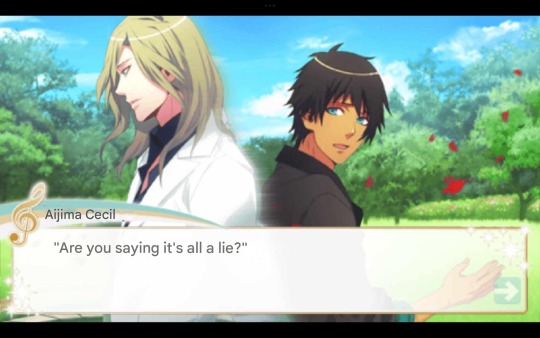
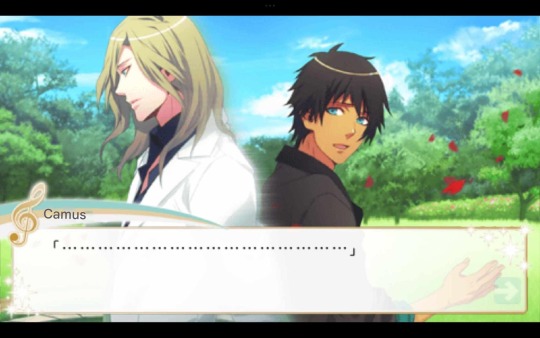
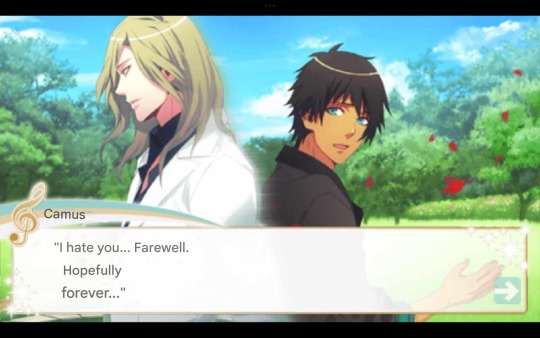
(I'll be using google lens because it's faster but I checked that the tls were okay)
He also does this in the Non-Fiction drama, which may or may not have actually happened, but I think it's still a pretty good reflection of what could happen in reality because he tells Ranmaru their bond was a lie, then mopes around in his guilt thinking about the good times and wondering why he's sad, and THEN later doubles down on the "it was a lie, I don't care about you" because he just can't let himself get attached to anything.
Basically, he's terrified at the thought of forming actual bonds because he genuinely thinks he's nothing if he stops being a cold weapon:
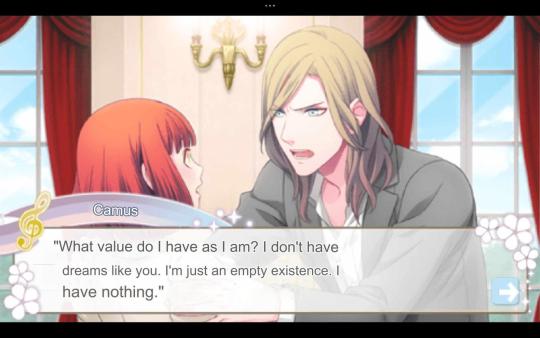
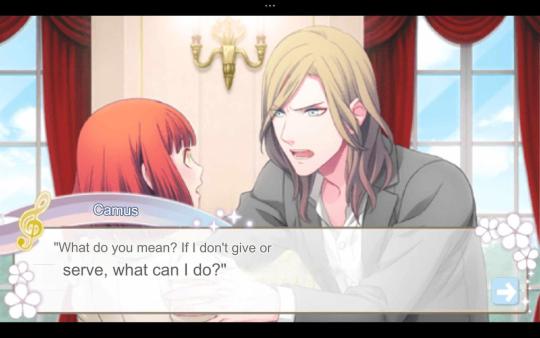
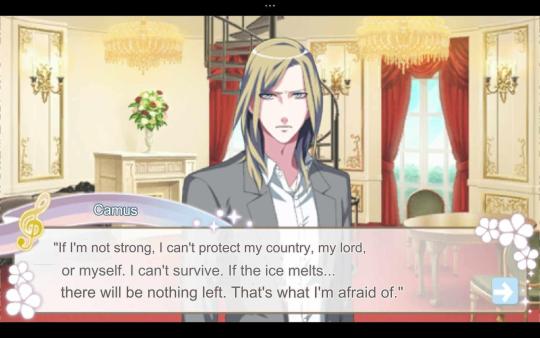
At one point he does admit he sucks (as a love interest)-
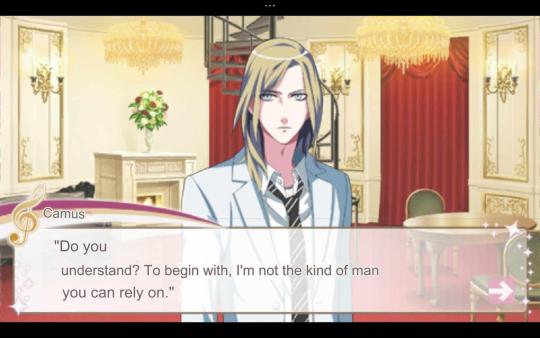
-which is pretty huge by utapri standards. I love these games, but the amount of times where a male lead does something icky, and everyone, including Haruka, acts like it's normal or like it's Haruka's fault is ehhh but I digress
Upbringing
Of course he's very proud of his homeland and status, but sometimes it's to the point of thinking he can't be anything other than his title. So why is he like this?
We got to hear about his childhood from Camus himself a few times, and it often ended with Haruka thinking "wait? that's kinda messed up?" and Camus insisting it's nothing/it's normal so yeah that's something...
His parents were in an unhappy arranged marriage, and his mother was forced to birth an heir which traumatized her so much that she can't see Camus without falling ill. Overall it's a pretty tragic situation since what happened to her was horrible, though not Camus's fault either. Even now she refuses to see him, and I wouldn't say that makes him sad because he never really met her, but simply knowing of her sacrifice probably adds a lot of pressure. As in, he only exists for this one purpose (inheriting his father's title and serving the country), so if he doesn't play his part correctly, it would have all been for nothing.
He was raised by his father not as a child or son but as the heir, always treated and judged as an adult (even during physical training apparently, make of that what you will)
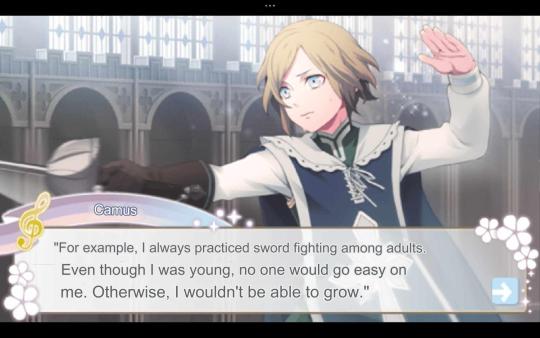
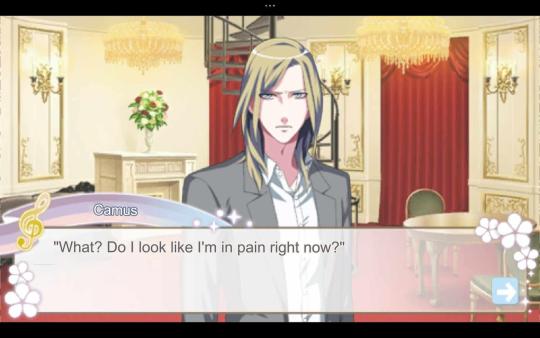
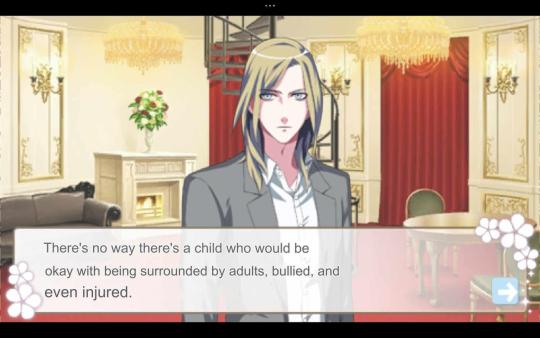
When Haruka asks about childhood memories he has a very hard time finding something that doesn't have to do with his duties or the nation. And then admits he didn't truly have a "childhood" since he was never treated like a child
As for the queen, I think his love for her is sincere: she taught him a lot of things growing up, and according to him, she's also a victim trapped by her duties so he wants to ease the burden.
So hypothetically, if he found things or people that made him happy in Japan, he would feel obligated to lock them away because that happiness is incompatible with his life: he'll have to leave when his mission ends, he shouldn't be spending time on things that aren't "useful" as he doesn't have the free will to pursue them
In his mind he's completely tied down by the fact that he was born and raised for a single reason, and the fact that he does want to serve the queen.
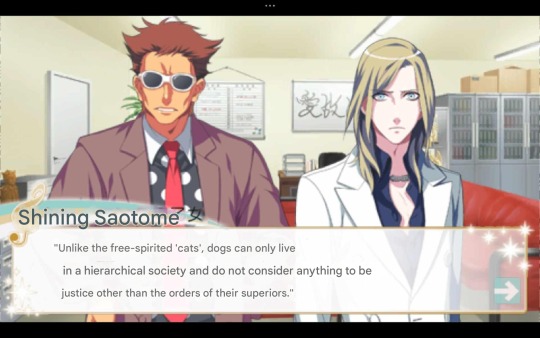
(This is Saotome describing him btw)
Also it might sound ridiculous to bring his self-worth into question because of how pretentious he is, but I've counted a few situations where he seemed to have complete disregard for his own life, only worrying about Haruka and Cecil's safety in scenes when they were present. And he thinks wanting to be loved unconditionally is a childish thought he shouldn't have.

"Double Face" was a lie. There's like at least 10 layers
On the surface he does have two personas, his perfect polite butler act for the media, and his cold bitchy attitude off camera. But honestly, even when he's not acting as a butler, he's often putting up a front to hide any form of vulnerability (from himself as well)
His main struggle is finding who he is outside of what he's being told to do. Before, he never actually stopped to think about what he WANTS because it just never occurs to him, or if it does he ignores it.
That's why realizing that he has his own desires is essential to his character development, and him staying with Quartet Night (and Haruka in his routes) is so important. It's why Reiji feels the need to reach out and when he does, Camus either freezes up or tears up;
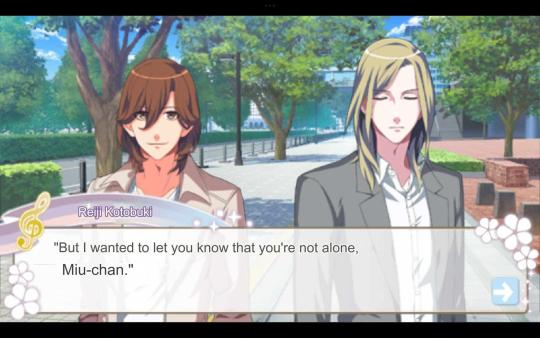
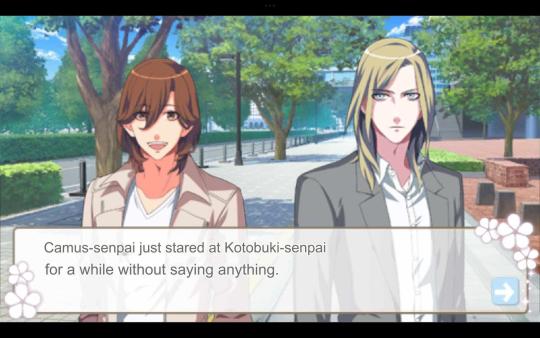
This all makes him the opposite of Ranmaru (being true to yourself and sincere), and similar to Ai (gradually learning to view the world in a less cold and logical way), but I kind of want to save that for another post lmao
He is especially hard on Cecil because Cecil says & does whatever he wants, and everything still works out for him, which is a way of life that Camus can't imagine for himself at all (despite maybe wanting it?)
That he can realize this and eventually admit out loud, despite all his pride, is also one of my favorite things about him
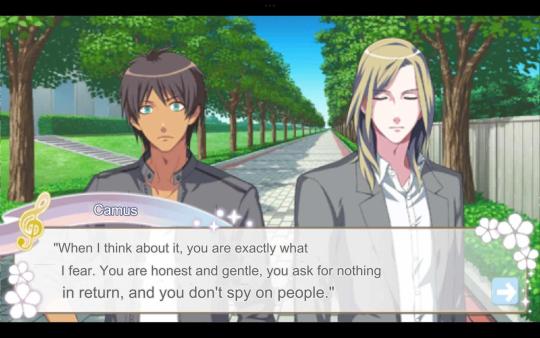
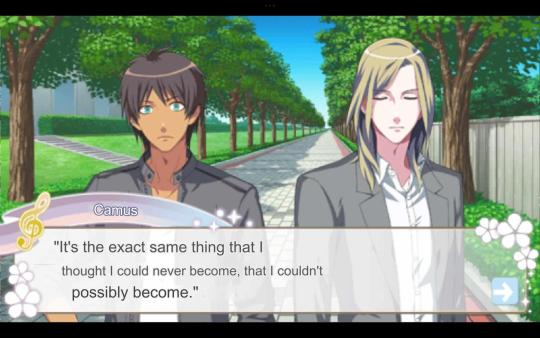
Season 2 does hint at something, so that's pretty cool!


Side note, I really love that his theme in the new Oracle series is "Change," the melting of ice.

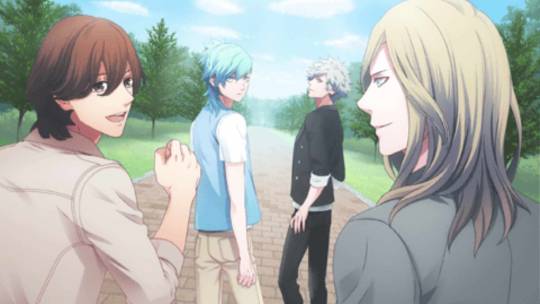
So what was the anime supposed to do??
Of course there's no way to show all this in a single episode or even during the runtime of the anime, and I never expected them to because the story is very surface-level (that goes for all characters).
It's just unfortunate since the anime is the most accessible and well-known utapri media in the western fandom, and the character's main episode is bound to leave the biggest impression.
I understand the choice of being laser-focused on the servant plotline, it's supposed to be funny (?) and waters him down to a trope that's easy to understand at first glance (the step-on-me guy I guess)
Still, I can't help but compare it to Ranmaru's episode, who was also hard to work with in the games but was chill in S3E7 and got to pet cats. Anime onlys will never know how much Camus loves to dote on his dog smh.....
#please don't take this too seriously#i just wanted to cry about camus#uta no prince sama#utapri#camus (utapri)#quartet night#cecil aijima#ranmaru kurosaki#reiji kotobuki#ai mikaze#tag for me yapping about utapri
130 notes
·
View notes
Text
I really enjoy how ohshc exaggerates how freakishly tall and short Mori and Hani are respectively.

This isn't that bad, but Hani is still made to look very short, especially in comparison to Mori. He should fall just between shoulder and elbow-level, but Haruhi seems to taken that spot, whereas she should be literally just below shoulder-level. Also, the twins should be just a little bit taller, as where Kaoru falls in comparison to Kyoya should actually by in comparison to Mori.

This is the most immediately egregious example, which is even funnier when you consider that Tamaki and Kyoya's heights are pretty spot-on. Hilary and Karou should be, in that pose, chin-level with Mori, especially since he's slouching.
Then, Haruhi. Once again, she is too short, but its worse this time. She's closest to the camera, but her head is where it would be if she were standing right next to Mori.
And Hani. Need I say anything? Realistically, for their heights, Hani's head should be above the twins' shoulders, and definitely not waist-level.
I'm mot ragging on it, by the way. I think it's really funny, and I wouldn’t have even noticed if I weren’t a massive dork and put their actual cannon heights in the heightcomparison website.
#ouran high school host club#ohshc#haruhi fujioka#mitsukuni haninozuka#takashi morinozuka#tamaki suoh#kyoya ootori#hikaru hitachiin#kaoru hitachiin#suoh tamaki#ootori kyoya#fujioka haruhi#hitachiin twins#hitachiin hikaru#hitachiin kaoru#haninozuka mitsukuni#morinozuka takashi
83 notes
·
View notes
Text
Okay I know I keep saying I'm gonna do a big post about Vincent in Rebirth and I've kinda been waiting until both my besties have gotten to him so that I can explode at both of them about him first, but there is one point that I've talked about a bit on the twits and I'm gonna babble about over here in greater detail.
There won't be a lot (if any?) direct spoilers here, but I'll be using screenshots that are absolutely spoilers to drive the point home, so keep that in mind.

Babbling under the cut.
One thing that really strikes me about Vincent's design in Rebirth is how he looks so...young. There's no other way to describe it, he looks young. In Advent Children and Dirge of Cerberus he had this sort of agelessness to him, particularly when compared to the rest of the cast; it was hard to get a read on how old he was aside from "younger than Hojo" because of this. He could have been anywhere from 25 to 35 at a glance, and up into a healthy 40+ during some scenes.
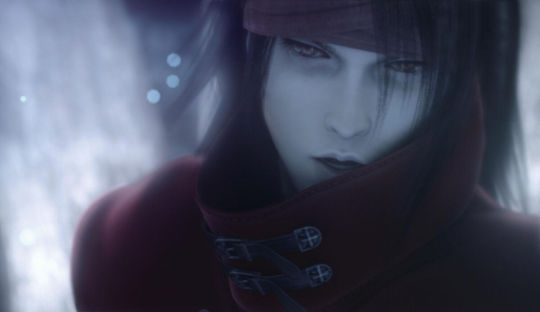
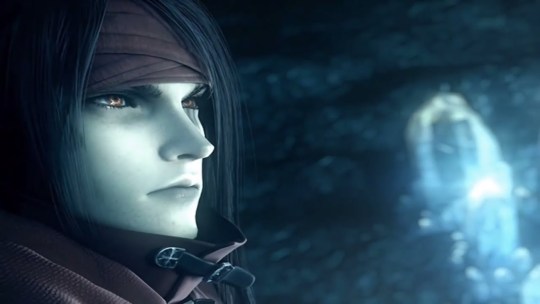
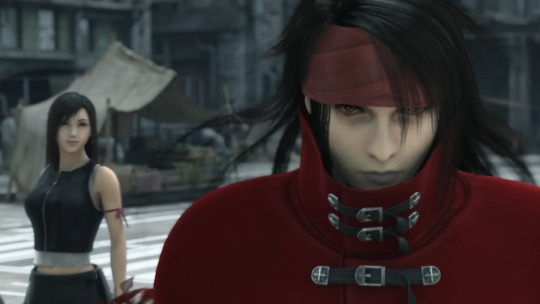
In Rebirth, that agelessness has been completely thrown out, and the only thing lending even an iota of uncertainty to his age is how covered up he is. The moment you see anything more than his eyes, it's excessively clear that this is a man in his mid-twenties, no older.



It's particularly obvious when he's confused or in pain, moments when he's not tooling his expression into something more neutral, when wouldn't be consciously presenting himself a specific way.
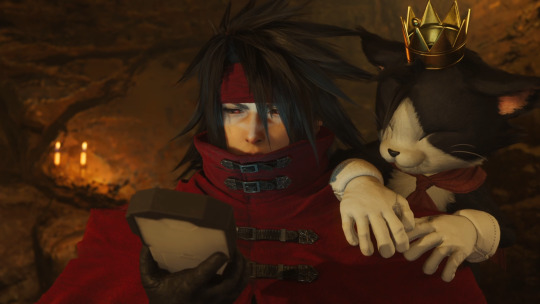

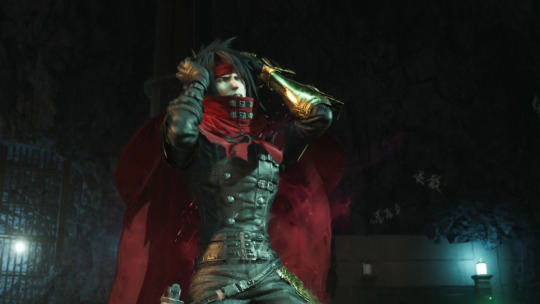
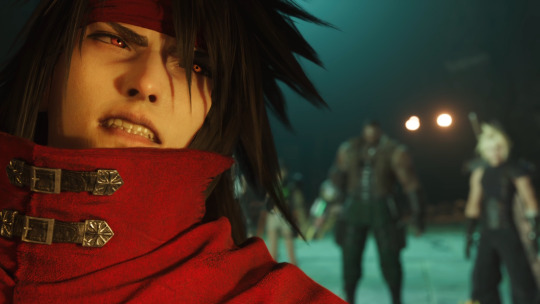
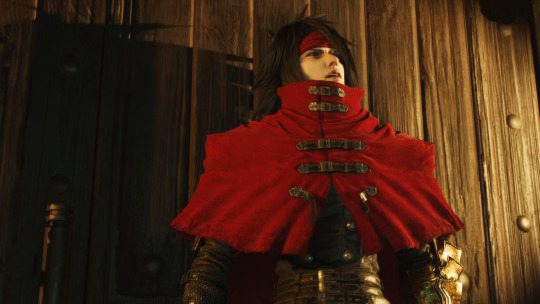
At a glance, Vincent is definitely older than Cloud, sure, but he's undeniably younger than Barret and Cid, he's younger than the majority of the extended cast—Reeve, Tseng, Rufus, the "emissary from Wutai," et cetera. He might even be younger than Sephiroth.
This makes the incongruity between his apparent age and his behavior hit particularly hard, in a way that it was never really able to in the Compilation thus far.
The way Vincent talks is off, noticeably off, and not just in a way to indicate education or accent—the way he structures his sentences follows grammatical standards from decades ago. Him commenting "if we're to stay the night" at Gold Saucer is one that really sticks out to me, because when other characters use similar sentence structure in the series (Genesis is the most egregious example of this) it's explicitly an indication that they're speaking in an old-fashioned way, they're being intentionally over-the-top. Vincent, though? He isn't doing that. The comment is so simple and offhand, there's no question that this is just how Vincent talks.
But he's a man in his twenties.
Vincent knows Dio as an antique collector, even though it's been over twenty years since he was in that business—Cid is the one that calls him out on this, because Cid clearly "knows" that he's older than Vincent, and Vincent brushes him off with a simple statement: "I've been around a while."
But he's...a man in his twenties?
When Cid warns him that the Tiny Bronco's radio is old enough to be considered an antique, Vincent is pleased—and in spite of having failed to properly operate the brick-phone-outdated security system in the mansion earlier, he has no problems operating the aforementioned antique radio.
But he's a man in his twenties! He's obviously a man in his twenties!
The juxtaposition between his appearance and his behavior is so stark as to be distressing; even if you don't know what happened to him, you can tell that there's something terribly wrong here.
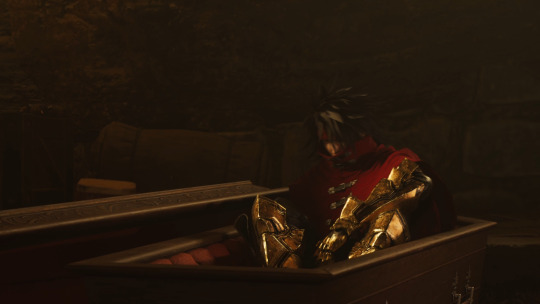
Because Vincent Valentine is a man in his twenties, and he will be until the end of the world.
235 notes
·
View notes
Text
i think my problem with this dw season arc accusing the audience of fanbrain for theorising about ruby is that it both feels deceitful and isn't actually that compelling from a character perspective. the season goes out of its way to build up supernatural mystery around ruby and even invokes susan more heavily than ever before in a way that is deliberately trying to get the audience to make those connections. and then it turns around and says you stupid idiot why would you ever try to connect these dots i have deliberately tried to get you to connect.
building up a mystery only for the character to be ordinary is an impossible girl arc redux only this time accusing the viewer of failing to see the humanity of the companion, whereas the impossible girl arc was turning that accusation on the doctor. 7b didn't really blame the audience for viewing clara as a puzzle and in fact several times spells out the fact that clara is perfectly ordinary before the big reveal to give the audience a chance to catch on. as 7b goes on, instead of laying the mystery on thicker, the audience just gets more and more affirmations that clara is a normal human being (rings of akhaten, journey to the centre of the tardis, hide). i found this approach compelling because it was rooted in character, focusing on the doctor's disconnection from humanity/the gendered dynamic of a man treating a woman as his manic pixie mystery to pull him out of grief. s14's meta approach of accusing the viewer feels both unfair, given it has deliberately led the viewer towards theorising, and personally less compelling to me because it wasn't tied into character in any way.
the thing about rey's parentage in tlj is that the reason rian johnson chose to go for that reveal was that it was the only answer that was interesting. none of the theories - rey is a skywalker, rey is a kenobi, and even the eventually canonical rey is a palpatine - were interesting or satisfying because they brought nothing compelling to the table for the story being told. the only satisfaction to be gained from those answers was a fanbrained "omg rey is important because she's related to that guy from the other movie." on top of that, rey desperately wants her parents to have been important, to give her life and her abandonment some kind of significance. so them being ordinary provided the most compelling trajectory for her character because it was the thing she least wanted to hear. it forced her to do the most introspection and growth, as well as tying into the film's themes about the capacity of ordinary people to be special. it wasn't just a choice made to "gotcha" the viewer, it was rooted in character.
i don't think ruby's mother being ordinary accomplishes the same thing. by invoking susan, s14 is engaging with the most egregious example of the doctor's streak of abandonment, which has potential to be very compelling in relation to ruby (and now also the doctor's) own abandonment issues. theories that ruby might be susan, or be somehow related to susan, or somehow related to the doctor, weren't just fanbrained "omg she's related to that guy i know from the classic series." they were theories genuinely rooted in character and the potential to explore both the doctor and ruby's issues with abandonment. and this is something the show willingly led fans towards by invoking susan so much in the first place. so for the show to turn around and act like they were shallow out of nowhere ideas when they were not shallow and were based on potential character conflicts the show itself deliberately invoked, feels misguided.
as well as that, ruby's mother being ordinary does not require that same growth from ruby as it did for rey because it is exactly what ruby wanted to hear. she never wanted her mother to be important, she just wanted to know who her mother was and have a connection with her. so finding out she was a normal woman who still loves her and wants to be a part of her life is everything she's ever wanted. it doesn't introduce interesting conflict for her the way rey's parents being ordinary did for her, because they were written as different characters with different hangups over their abandonment.
tl;dr i don't necessarily dislike ruby's mother being ordinary as an idea but compared to the things it was inspired by - 7b and star wars - it is not nearly as compelling in terms of how it relates to the characters or themes. and the meta angle, while conceptually interesting, doesn't quite work for me because it feels a little manipulative of the audience.
#blahs#dw#dw spoilers#like to be clear i'm not necessarily saying ruby's mother SHOULD have turned out to be susan#i'm saying that if it was always going to be an ordinary woman then rtd should've constructed a better arc around that#bc for the one he did write it's not that compelling of an answer. it doesn't really move anyone forward except maybe the doctor himself#bc the doctor is now sad that ruby has what he can never find#like yeah okay that's interesting... next season. and for the doctor. but not really for ruby!! and not for s14 as a whole!!#and like pulling the rug out of a mystery like this is something moffat also did a lot#like invoking the name of the doctor only to not reveal it or teasing the hybrid as a big alien villain only for it to be twelveclara#but the thing about those is that moffat never makes the answer that he rejects genuinely compelling#like he rejects learning the doctor's name bc there is nothing compelling about knowing it and he never tries to make you think there is#he rejects the hybrid as a warrior alien bc there's nothing compelling about that and he doesn't try to make you think there is#i feel subversive moffat mysteries are always leading you towards why the answer he gives you is the most compelling one#which i don't think s14 accomplishes. instead it's like haha! tricked you! your genuinely interesting theories are silly and dumb!#idk. i see the vision but i don't think it was handled with a deft hand so it ended up kind of a mess that didn't land imo
134 notes
·
View notes
Text
folks, I'm once again telling you that the CritRole Fandom wiki is REALLY bad. most of the competent editors left over a year ago, and those left either prioritize speculative editorializing so that the articles are full of extremely presumptive unconfirmed half-truths OR they don't give a shit about non-CritRole stuff so their non-CritRole coverage is abysmal and completely wrong.
One of the most egregious examples right now is in their Candela coverage bc the editors have interpreted a figure of speech from Beatrix as literal, so there's this straight up weird incorrect statement in a couple of the articles:

This flat out isn't true! When Beatrix said that Nathaniel opened up a hole the Finnertys fell into, she meant it figuratively in reference to Nathaniel's work as a recruitment officer (see: when she talks to Nathaniel later in 2.02 at the Silverslip chapter house). She blames him indirectly in a domino effect; she's not referring to a literal portal, she's blaming him as having played a Pied Piper bringing them into the war! This is not only wrong, it's wrong about a MAJOR plot point of Candela Chapter 2 in a way that would fundamentally alter the narrative, given how important it is to Sean to avenge his brothers' deaths, but I've seen the above incorrect information repeated in the fanspace multiple times by multiple people in the months since.
Don't assume everything you read in a wiki article is true, especially the CritRole Fandom wiki but any wiki (even the solid ones!). Check things against the citation when you can! Do your due diligence.
Also someone please edit the articles to remove this or something. I can't bc I'm persona non grata there. But, forreal, it's funny how bad the editors at the Fandom wiki are at this until you realize that this gets repeated throughout the fanspace.
269 notes
·
View notes
Text
i feel like some su fans don't realize Pearl isn't keeping a promise when she covers her mouth, she literally cannot speak of it because Rose made it a command, not a suggestion/request.
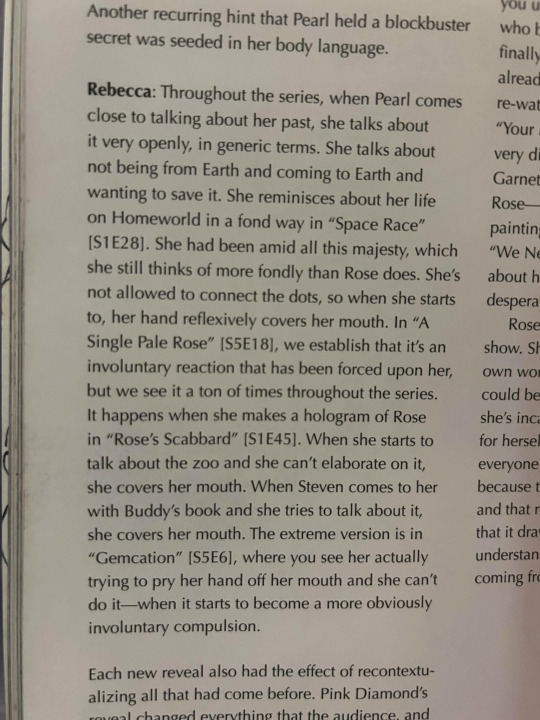
picture from end of an era
we know from an interview (cant find it) that Pearl's compulsion to obey the command is unique to Pearl - that no, Garnet wasn't forced by Rose to never ask questions. Pearl is uniquely programmed to obey a direct command like that because she was designed for Pink. this is a horrifying little bit of worldbuilding lol, thanks crewniverse - but it definitely makes Rose's act go from manipulative to outright egregious
what Rose does here to Pearl (by gagging her), is what the diamonds do to all gems. it's a highly institutionalized violation of agency that robs every gem, especially those of lower caste, of freedom, individuality, and autonomy. quantifiably, the gag order doesn't rob Pearl of much (there's only one thing she can't do after all), but for Rose to silence Pearl at all, to take away her voice, has enormous implications thematically and for Rose's character. Rose knows Pearl isn't able to resist the command, she gives it with the intention of taking advantage of her innate programming (designed by, and representative of, a system they both hate!) to forcibly prevent disobedience. this is WHILE she's trying to establish equality between them! if i were Pearl, i know id struggle with understanding where i stand. the signals are mixed as hell.
and we know Pearl wasn't sure she was equal, even after Rose's death. one example being - "who am i now in this world without her? petty and dull with the nerve to doubt her." i think occasionally members of the fandom fail to recognize or overlook that especially in her worst moments, Pearl STILL felt less than Rose, not only hierarchically but just fundamentally worth *less.* it's a struggle she eventually overcomes, yet during the run of the show, she's still fighting that battle. we also know from ep 2 of future (wherein steven tries to give all the gems non-homeworld-purpose related tasks), we know gems tend toward their original designed purpose.
but this isn't a Rose hate post and i wouldn't be caught dead writing one.
so what was happening when she gave the gag order? we know from the episode "bismuth," rose told bismuth she could be anything she wanted to be, that gems could choose for themselves. rose fought a whole war to free any gem who wanted to be free and to protect humanity. she told garnet (practically) to make her own identity and create her own purpose. how is this the same person who abused her power over pearl to make her keep a secret?
in end of an era, rebecca says: "[rose] makes sense once you know she is her own worst enemy. she dreams, achingly, that she could become compassionate, because she's sure she is incapable of compassion. her lack of respect for herself makes it impossible for her to respect everyone closest to her."
and that therein is the tragic heart of the problem. Rose hates herself. she wants to change, she wants to be good, but even when she IS good - she can't see it for what it is, past her own shame and self-disgust. it makes it "impossible to respect everyone closest to her" - including, and most damagingly (becuz of her purpose on homeworld and accompanying trauma), to Pearl. Blue and Yellow planted the seeds of self-hate, and developing her own value system on earth and learning to despise the diamonds' for the system they upheld reinforced that she, by just being a diamond at all, MUST be bad. she longed to be good but could conceive of no pathway to do so, except hiding her "villainy" permanently behind a "hero" mask and running away.
Rose couldn't even tolerate the slightest chance Pearl might say something, that's how deep the fear and shame ran, that she felt the need to do an absolutely horrible thing to a gem she very dearly loved in order to make sure her worst fear could never come true. people who need control need it to feel safe. it's kinda like that. the irony is that in trying desperately to hide that she's a diamond, she makes the fatal mistake of doing what a diamond does - controlling those beneath them in the hierarchy and reducing them down to their designed purpose. she tried hard not to be pearl's owner and not to treat pearl like her slave, but in this moment of finally escaping those roles, she embodies them briefly - with lasting consequences. it's an ego-dystonic betrayal of her own values impelled by self-hate and fear. it's heartbreaking for both of them.
Pearlrose's issues were varied but miscommunication was a big one. now they can't ever talk about it. what a difference it would have made if Rose hadn't done what she did. i wonder how often she wished she didn't (thought to herself, "pearl doesn't deserve that, how could i do that?"), then felt that fear creep back up, and maybe even wondered whether pearl's love was even genuine, or if it was totally hollow. in greg the babysitter she says, "When a gem is made, it's for a reason, they burst out of the ground already knowing what they're supposed to be, and then.. that's what they are. Forever." She says it almost sadly. like she's not sure she's anything but what she's always been, maybe even unsure pearl's anything but what she's always been. how can you trust someone to keep the deepest, most shameful secret of your life, if you're not even sure this person loves you sincerely?
we know Rose is tragically wrong here. she could grow and change. the gems are entirely capable of growth. every central character grows over the show- including Rose, we just watch it backwards! but she can't see herself for who she is and it's what doomed her.
isn't that the essential symptom of shame? Rose's self-loathing hurt not only herself, but Pearl (and Bismuth, Sapphire and Ruby, etc.) and she spent thousands of years healing from it. by hiding and hurting ourselves, we hurt others inevitably.
32 notes
·
View notes